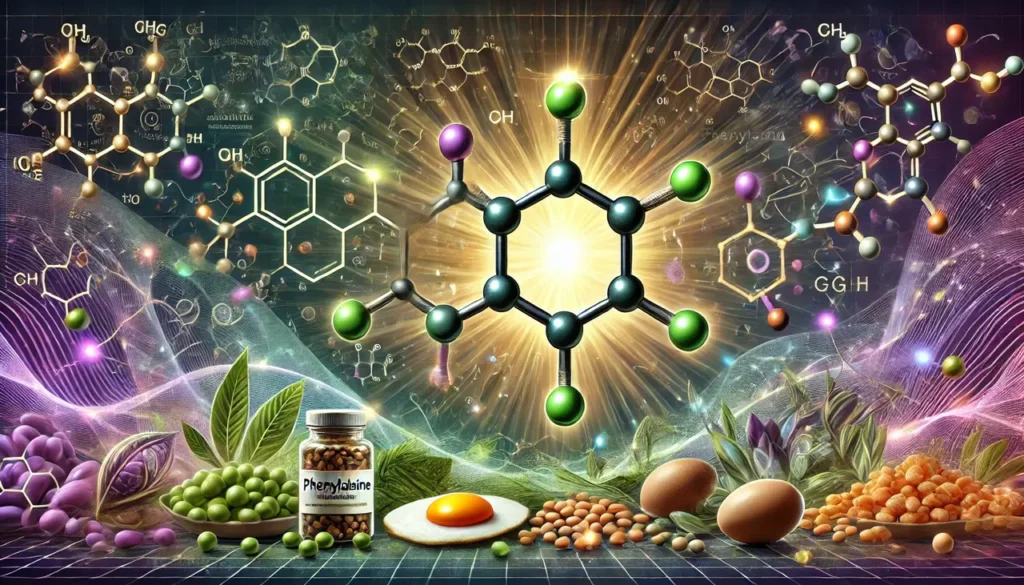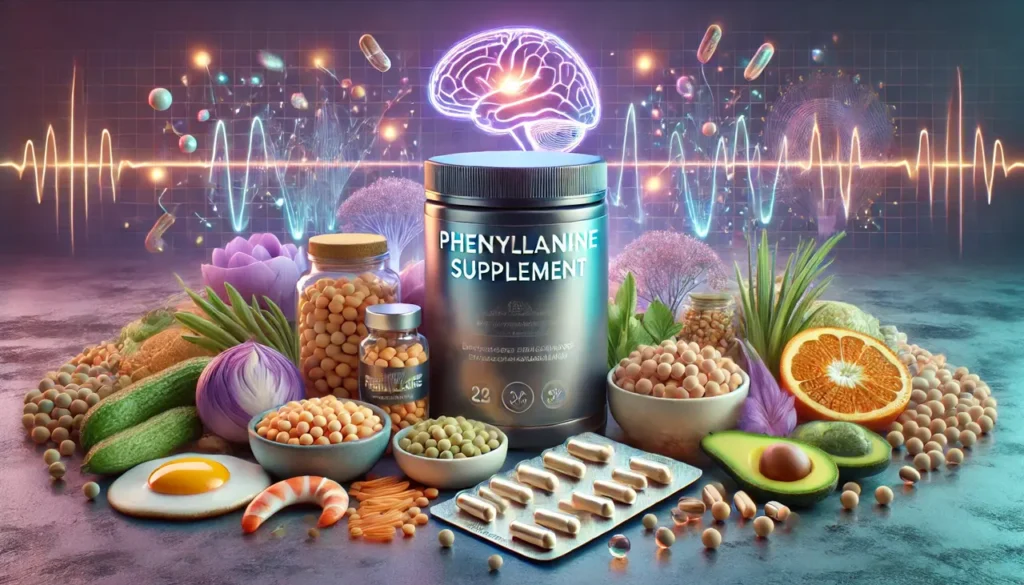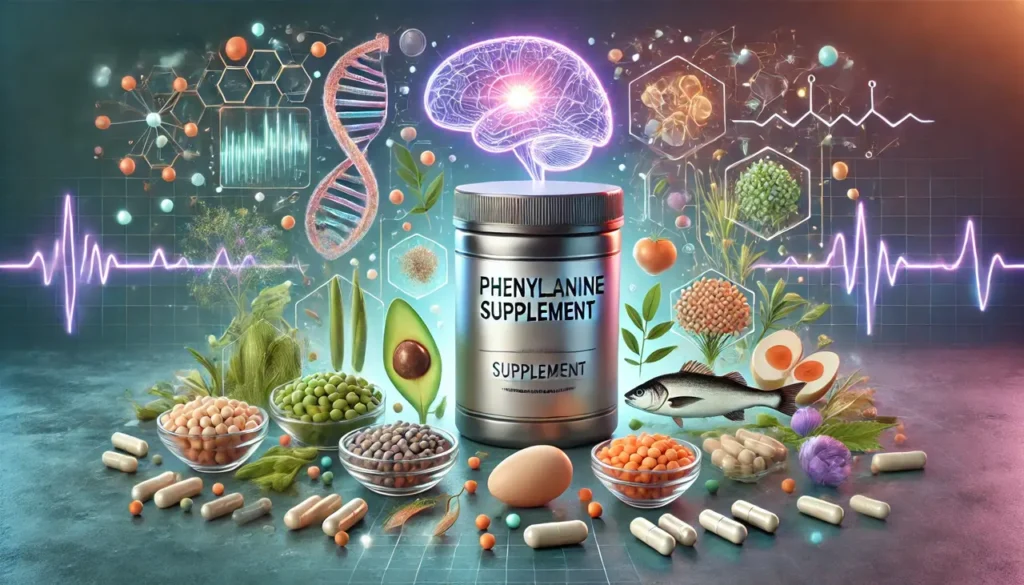Phenylalanine is an essential amino acid that plays a crucial role in protein synthesis and neurotransmitter regulation in the human body. As an essential amino acid, phenylalanine must be obtained through dietary sources since the body cannot synthesize it. Its importance in producing neurotransmitters, such as dopamine, norepinephrine, and epinephrine, has led to its examination for potential nootropic effects. This article delves into phenylalanine’s sources, chemistry, physiological mechanisms, potential nootropic benefits, dosage recommendations, side effects, drug interactions, and important safety considerations.
You May Also Like:
Sources of Phenylalanine
Phenylalanine is naturally present in a variety of food sources. As an essential amino acid, it is found in high-protein foods, including:
- Animal-based foods: Red meat, poultry, fish, eggs, and dairy products.
- Plant-based foods: Soy products, nuts, seeds, and legumes.
There are three different forms of phenylalanine:
- L-Phenylalanine (LPA): The natural form found in foods and used for protein synthesis.
- D-Phenylalanine (DPA): A synthetic version of phenylalanine, typically produced in laboratories and used for pain management.
- DL-Phenylalanine (DLPA): A combination of L-phenylalanine and D-phenylalanine, which is often used in supplements for both cognitive enhancement and mood support.
Enhance Brain Function and Mood Stability with Premium Phenylalanine Supplements—Shop Today on Amazon!
Boost Your Brain’s Performance and Nerve Wellness with Phenylalanine Supplements—Shop Now on Amazon!

Chemistry of Phenylalanine
Phenylalanine is classified as a nonpolar, aromatic amino acid due to its phenyl group attached to an alanine molecule. This amino acid serves as a precursor to tyrosine, which is then converted into dopamine, norepinephrine, and epinephrine—key neurotransmitters involved in mood regulation, stress response, and cognitive function.
The conversion pathway of phenylalanine involves its hydroxylation by the enzyme phenylalanine hydroxylase, producing L-tyrosine. Tyrosine is subsequently used to produce levodopa (L-DOPA), which then leads to dopamine. Dopamine can be further converted into norepinephrine and epinephrine through enzymatic reactions involving dopamine beta-hydroxylase and phenylethanolamine N-methyltransferase. These neurotransmitters are integral to various aspects of brain function, including memory, motivation, and stress resilience.

Physiological Mechanisms of Phenylalanine in the Body and Brain
Phenylalanine’s primary role is in the production of proteins and neurotransmitters. As a precursor to dopamine, norepinephrine, and epinephrine, phenylalanine plays a critical role in the catecholamine pathway. These neurotransmitters are involved in regulating mood, attention, and stress response, which is why phenylalanine has garnered interest for its nootropic potential.
- Dopamine Regulation: Dopamine is essential for reward processing, motivation, and memory. Supplementation with phenylalanine may increase dopamine levels, thereby enhancing cognitive functions like focus and learning. Elevated dopamine levels may also improve mood and reduce feelings of fatigue.
- Norepinephrine and Epinephrine: These neurotransmitters are vital for the “fight or flight” response, helping to increase alertness, energy, and attention under stressful conditions. Phenylalanine supplementation could support mental clarity and focus during periods of stress or mental fatigue.
- Role in Pain Management: D-Phenylalanine (DPA) is believed to block the enzyme carboxypeptidase A, which degrades endorphins in the body. This suggests that DPA could help increase endorphin levels, potentially reducing pain perception and elevating mood.
Elevate Focus and Nerve Strength with Scientifically Backed Phenylalanine—Order Now on Amazon!

Potential Nootropic Benefits of Phenylalanine
Phenylalanine is not traditionally classified as a nootropic, but its influence on neurotransmitter production suggests it could offer cognitive benefits. The potential nootropic effects include:
- Mood Enhancement: Due to its role in dopamine production, phenylalanine supplementation may help improve mood, reduce symptoms of depression, and increase overall emotional well-being. Studies suggest that phenylalanine can enhance the brain’s reward system, making it beneficial for individuals experiencing mood disorders.
- Cognitive Performance in Stressful Conditions: Phenylalanine’s ability to increase norepinephrine levels may help improve focus, attention, and decision-making under stress. This could be particularly useful for individuals dealing with high-stress environments or mental fatigue.
- Support for ADHD: Some research suggests that individuals with attention deficit hyperactivity disorder (ADHD) may have low levels of dopamine. Since phenylalanine supports dopamine synthesis, it has been investigated as a potential adjunctive treatment for ADHD, though more research is needed to confirm its efficacy.
- Pain Relief and Mental Clarity: D-phenylalanine’s inhibition of endorphin-degrading enzymes may not only offer pain relief but also elevate mood and enhance mental clarity. This combination of benefits could make it a useful adjunct in pain management and cognitive support for individuals with chronic conditions.
- Improved Memory Retention: Phenylalanine’s role in dopamine production may support memory formation and retention by enhancing the brain’s synaptic plasticity. This could be especially beneficial for individuals seeking to improve learning capabilities or those experiencing age-related memory decline.
- Increased Motivation and Drive: Since dopamine is closely linked to the brain’s reward and motivation pathways, phenylalanine supplementation may help increase motivation and mental drive. This could be useful for individuals needing a cognitive boost to stay engaged in tasks and avoid procrastination.
- Enhanced Alertness and Wakefulness: Phenylalanine’s effect on norepinephrine and epinephrine can increase alertness, making it helpful for individuals seeking to improve their wakefulness and mental clarity throughout the day. This could be especially beneficial for combating mental fatigue during long work hours or demanding cognitive tasks.

Dosage and Supplementation Guidelines
The appropriate dosage of phenylalanine depends on its intended use and the form of the supplement (LPA, DPA, or DLPA). Here are general guidelines for dosing:
- For Cognitive Enhancement and Mood Support: Doses of L-phenylalanine typically range from 500 mg to 1,000 mg per day. This amount is thought to provide enough precursor material to support dopamine and norepinephrine synthesis without causing significant side effects.
- For Pain Management (Using D-Phenylalanine): Doses of D-phenylalanine for pain relief are often higher, ranging from 500 mg to 2,000 mg per day. It is important to note that DPA is not commonly used for cognitive enhancement but more for pain control.
- Combination Supplements (DL-Phenylalanine): DL-phenylalanine is typically taken at doses of 500 mg to 1,500 mg per day. This combination allows for both mood enhancement and pain relief, making it a popular choice for individuals seeking both nootropic and analgesic effects.
As with all supplements, it is advisable to start with a lower dose and gradually increase it to assess individual tolerance. Consulting a healthcare provider before beginning supplementation is particularly important for individuals with pre-existing health conditions.
Recharge Cognitive Health and Nerve Wellness with Phenylalanine Supplements—Shop Amazon’s Best Now!

Side Effects and Safety
Phenylalanine is generally well-tolerated when taken at recommended doses, but there are potential side effects, especially when taken in high amounts or by individuals with certain health conditions. Common side effects may include:
- Nausea: Some users report mild nausea after taking phenylalanine supplements, particularly when taken on an empty stomach.
- Headache: Phenylalanine’s effects on neurotransmitter production could lead to headaches in some individuals.
- Insomnia: Due to its stimulating effects on catecholamine production, phenylalanine taken late in the day could interfere with sleep.
- Anxiety: High doses may overstimulate the nervous system, leading to feelings of anxiety, jitteriness, or restlessness.
Interactions with Other Supplements and Medications
Phenylalanine interacts with several medications and supplements, which could either enhance or diminish its effects or potentially lead to adverse reactions. Some important interactions to be aware of include:
- Antidepressants: Individuals taking monoamine oxidase inhibitors (MAOIs) should avoid phenylalanine, as it could lead to a dangerous increase in neurotransmitter levels, causing hypertensive crises. Similarly, individuals taking selective serotonin reuptake inhibitors (SSRIs) should exercise caution, as the combined effects on neurotransmitter systems could result in serotonin syndrome or other adverse effects.
- Stimulants: Phenylalanine may enhance the effects of stimulant medications (e.g., amphetamines used for ADHD), potentially leading to overstimulation, anxiety, or increased heart rate.
- Levodopa (L-DOPA): Because phenylalanine competes with L-DOPA for transport across the blood-brain barrier, individuals taking levodopa for Parkinson’s disease should avoid phenylalanine supplements, as it could reduce the effectiveness of the medication.
- Tyrosine Supplements: Since phenylalanine is converted into tyrosine, individuals taking tyrosine supplements may not need additional phenylalanine. Excessive tyrosine can lead to overstimulation and an imbalance in neurotransmitter levels.

Risks for Individuals with Certain Health Conditions
While phenylalanine is safe for most people, individuals with certain health conditions should avoid this supplement or use it with caution:
- Phenylketonuria (PKU): Individuals with PKU, a genetic disorder, lack the enzyme phenylalanine hydroxylase needed to convert phenylalanine into tyrosine. As a result, phenylalanine can accumulate to toxic levels, leading to severe cognitive and developmental issues. Individuals with PKU must strictly avoid phenylalanine, including in supplements and diet.
- Hypertension: Phenylalanine’s stimulating effects on norepinephrine production may increase blood pressure, which could pose a risk to individuals with hypertension or cardiovascular conditions.
- Schizophrenia: Some research suggests that phenylalanine may exacerbate symptoms in individuals with schizophrenia due to its effects on dopamine metabolism.
Conclusion
Phenylalanine is a versatile amino acid with significant roles in protein synthesis and neurotransmitter production. Its potential as a nootropic lies in its ability to enhance mood, increase focus, and improve cognitive function, particularly in stressful situations. However, like all supplements, phenylalanine should be used with caution, particularly for individuals with pre-existing health conditions or those taking medications that may interact with it.
For optimal cognitive enhancement and overall well-being, it is important to consult with a healthcare professional before adding phenylalanine to your supplement regimen and to carefully monitor dosage and any potential side effects.

References:
- Phenylalanine: Role of Amino Acid and Purpose in Diet . Retrieved from: https://www.verywellhealth.com/phenylalanine-8695598
- What to know about phenylalanine. Retrieved from: https://www.medicalnewstoday.com/articles/phenylalanine
- Phenylalanine Benefits for Mental Health (Plus, Dosage and More). Retrieved from: https://draxe.com/nutrition/phenylalanine/
Important Note: The information contained in this article is for general informational purposes only, and should not be construed as health or medical advice, nor is it intended to diagnose, prevent, treat, or cure any disease or health condition. Before embarking on any diet, fitness regimen, or program of nutritional supplementation, it is advisable to consult your healthcare professional in order to determine its safety and probable efficacy in terms of your individual state of health.
Regarding Nutritional Supplements Or Other Non-Prescription Health Products: If any nutritional supplements or other non-prescription health products are mentioned in the foregoing article, any claims or statements made about them have not been evaluated by the U.S. Food and Drug Administration, and such nutritional supplements or other health products are not intended to diagnose, treat, cure, or prevent any disease.
